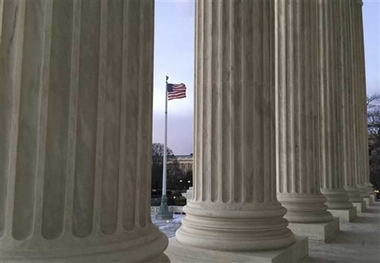Some key opinions from Justice Antonin Scalia

Supreme Court Justice Antonin Scalia, the conservative and provocative judge who died at age 79, was known for pointed language, fiercely held opinions and a sardonic wit that at times invoked fairy tales, foreigners and hippies.
Since joining the court in 1986, Scalia weighed in — often colorfully and memorably — on the major issues of the day, including guns, gay marriage and the death penalty.
Some of the significant opinions he wrote for the court's majority — as well as the dissents for which he is perhaps even better known:
DISTRICT OF COLUMBIA v. HELLER, 2008
Scalia was responsible for the majority opinion in a seminal Second Amendment case, writing for the court in a 5-4 ruling that upheld the right to have guns for self-defense in the home.
Turning aside a District of Columbia ban on handguns, Scalia leaned on English and colonial history in declaring that the individual right to bear arms clearly exists and is supported by the 'historical narrative."
In the concluding lines of the opinion, which divided the court's liberals and conservatives, he acknowledged the views of those who considered the Second Amendment "outmoded" at a time of serious gun violence and when "our standing army is the pride of our nation."
"That is perhaps debatable," he wrote, "but what is not debatable is that it is not the role of this court to pronounce the Second Amendment extinct."
___
BROWN v. ENTERTAINMENT MERCHANTS ASSOCIATION, 2011
In an opinion that name-dropped Hansel and Gretel, Cinderella and Homer's Ulysses, Scalia rejected attempts by California to restrict the sale or rental of violent video games to children.
A state, he wrote in the majority decision, has the authority to protect children from harm, "but that does not include a free-floating power to restrict the ideas to which children may be exposed."
California's argument would make more sense, he added, if there was a longstanding tradition of restricting "children's access to depictions of violence, but there is none."
What to make, he wrote, of how Cinderella's evil stepsisters get their eyes pecked out by doves? Or of Odysseus, a hero of Greek mythology, blinding Polyphemus the Cyclops with a heated stake?
"And Hansel and Gretel (children!) kill their captor by baking her in an oven," he wrote.
___
ROPER v. SIMMONS, 2005
Scalia famously dissented from a 5-4 decision that declared the execution of juvenile criminals to be unconstitutional. He took a similar stance in 1989 when he wrote the opinion, Stanford v. Kentucky, that allowed states to use capital punishment for killers who were 16 or 17 when they committed their crimes.
In his biting Roper v. Simmons dissent, he ridiculed the notion that states that had abandoned capital punishment altogether should be included in a discussion about the juvenile death penalty.
Consulting states that had no death penalty about making an exception for offenders under 18, he wrote, "is rather like including old-order Amishmen in a consumer-preference poll on the electric car. Of course they don't like it, but that sheds no light whatever on the point at issue."
And he took particular exception to the majority's willingness to take guidance from foreign courts and legislatures, saying that the meaning of the Eighth Amendment should not be "determined by the subjective views of five members of this court and like-minded foreigners."
___
OBERGEFELL v. HODGES, 2015
Scalia's dissent in this landmark 5-4 case, which gave same-sex couples the right to marry nationwide, was in some ways vintage Scalia: mocking, angry and unabashedly sarcastic.
He noted bluntly that the Constitution did not mention a right to same-sex marriage before going on to lampoon the majority's opinion — written by Justice Anthony Kennedy — as pretentious, egotistic and, at times, "profoundly incoherent."
Had he joined in an opinion written like Kennedy's, he observed wryly in one footnote, "I would hide my head in a bag."
"Today's decree says that my ruler, and the ruler of 320 million Americans coast-to-coast, is a majority of the nine lawyers on the Supreme Court," he said at one point.
Elsewhere, he ridiculed the other side's assertion that a couple, through marriage, can discover freedoms "such as expression, intimacy and spirituality."
"Really?" he wrote incredulously. "Who ever thought that intimacy and spirituality (whatever that means) were freedoms? And if intimacy is, one would think freedom of intimacy is abridged rather than expanded by marriage. Ask the nearest hippie."
___
LAWRENCE v. TEXAS, 2003
Twelve years before the Obergefell decision, Scalia dissented from a seminal gay rights opinion that struck down a Texas law banning sodomy.
The 6-3 opinion in Lawrence v. Texas reversed an earlier ruling from the court, Bowers v. Hardwick, that upheld the constitutionality of a law banning gay sex acts.
While the majority decision stressed the importance of respect for personal privacy, Scalia, taking the unusual step of reading his dissent from the bench, accused his colleagues of having "taken sides in the culture war" and having largely signed on to the so-called homosexual agenda.
He maintained that even though he had "nothing against homosexuals," the opinion could open the door to same-sex marriage.
The decision would represent, he warned, "the end of all morals legislation."
Copyright 2016 The Associated Press.
The Gayly- 2/14/2016 @ 11:36 AM CST





